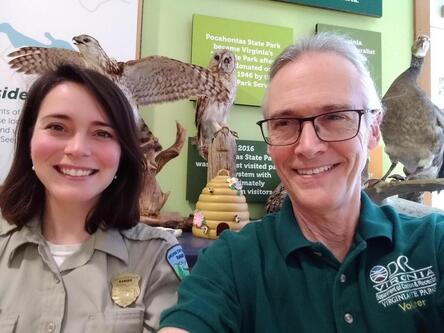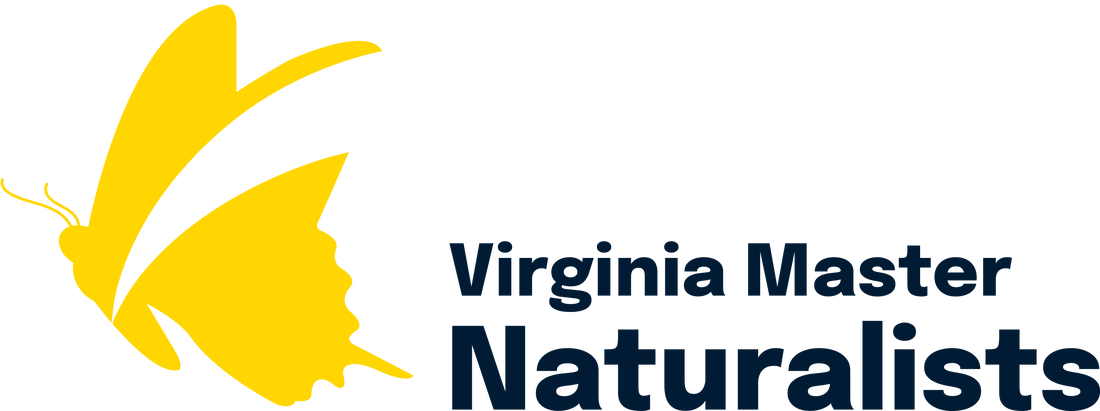 Rebecca Whalen, Chief Ranger of Visitor Experience at PSP, and Jeff DeHoff, VMN Pocahontas Chapter, discuss interpretation of raptors found at Pocahontas State Park. Photo by Jeff DeHoff.
Rebecca Whalen, Chief Ranger of Visitor Experience at PSP, and Jeff DeHoff, VMN Pocahontas Chapter, discuss interpretation of raptors found at Pocahontas State Park. Photo by Jeff DeHoff. Leaders of the Virginia Master Naturalist program have been partnering with leaders in Virginia State Parks for several years with a goal of increasing VMN volunteering in the parks, especially related to park interpretive programs. We hope to have VMN volunteers increase the capacity of the parks for offering talks, walks, paddles, special events, school programs, and other educational programming. We have made great progress so far; in 2022, VMN volunteers contributed 2,734 hours of education and outreach across 25 different parks.
To help increase volunteers' skills and confidence as natural resource interpreters, Virginia State Park staff have offered interpretation workshops at several VMN state conferences, as well as at other times of the year. In addition, there are opportunities for highly motivated and involved VMN volunteers to attend the Virginia State Parks Spring Interpretive Training workshop, where they learn about interpretation alongside park staff. VMN volunteer Jeff DeHoff (Pocahontas Chapter) attended the 2023 workshop, and we interviewed him about his experience.
How did you find out about the spring interpretive training workshop with State Parks, and what made you want to attend?
I started assisting Rebecca Whalen, Chief Ranger of Visitor Experience at Pocahontas State Park, with educational programs for youth field trips. I was working with small and large groups of varying ages from schools and youth development organizations. I let her know I wanted to improve my skills at delivering impactful information in a short program. Rebecca suggested the Interpretive Training Workshop and she asked Christen Miller, who directed the statewide workshop for DCR, if there was room for a non-staff volunteer. Fortunately, I was given a warm welcome.
What are a few things you learned or new skills you developed at the workshop?
Foremost, I learned that "Interpretation" is a skill and a vocation. I had certainly experienced some great programs in state and national parks, but never realized that the presenters were specifically trained and not just good speakers. Before the workshop, I took the online training "Foundations of Interpretation" and a new world opened up. Through the excellent training sessions at the workshop, I learned more about forging emotional and intellectual connections between the interests of the audience and the meanings inherent in the resources we are talking about.
Have you used what you learned yet for any interpretive programs? If so, what sort of programs have you done?
Yes, I started using these new skills right away in several programs. One program that is fun to deliver to all age groups is the adaptations of animals. Using the beaver as an example, we can engage the youth to investigate why this mammal has the physical features that it does and why beavers are important to the ecosystem. Also, we have a popular program on Wilderness Survival that I am now able to deliver to a variety of groups and make the content age appropriate and keep the audience engaged using the skills of Interpretation. Depending on what the audience needs, I have learned how to do a 15-minute program or a full hour on the same topics.
I am working on my "walk around" interpretation skills. I want to improve my ability to approach a family or individual or small group in the park and engage them meaningfully in a 5 minute conversation about the importance of conserving our natural resources that they are experiencing. It is a joy to share a personal passion.
What do you like about doing interpretation in the State Parks?
The thing I like most is interacting with youth and starting or fanning the flame of interest in our natural world. Not just the facts and predictions about change, but mostly the spirit and rhythm of this marvelous complex natural creation that existed long before humans dominated the landscape. Mother Earth can be experienced in many ways and we can learn to live with her and accept her support without selfishly destroying her. The young people will save this world from the current destructive directions supported by misguided thinking and unsustainable priorities. Interpretation of the natural and historic resources at Pocahontas State Park is a way to point to the door to a better future.
I look forward to additional training in Interpretation through online and in-person programs. Perhaps I can become certified to assist in training others. It is good to keep learning and keep sharing as we walk through our later years.
Anything else you want to share about your experience as a VMN volunteer or a Virginia State Parks volunteer?
If you are a VMN volunteer who, like Jeff, is already committed to volunteering as an educator in a state park near you and who wants to increase your interpretive skills, please contact a ranger at the park to discuss possibilities for additional in-depth training.
To help increase volunteers' skills and confidence as natural resource interpreters, Virginia State Park staff have offered interpretation workshops at several VMN state conferences, as well as at other times of the year. In addition, there are opportunities for highly motivated and involved VMN volunteers to attend the Virginia State Parks Spring Interpretive Training workshop, where they learn about interpretation alongside park staff. VMN volunteer Jeff DeHoff (Pocahontas Chapter) attended the 2023 workshop, and we interviewed him about his experience.
How did you find out about the spring interpretive training workshop with State Parks, and what made you want to attend?
I started assisting Rebecca Whalen, Chief Ranger of Visitor Experience at Pocahontas State Park, with educational programs for youth field trips. I was working with small and large groups of varying ages from schools and youth development organizations. I let her know I wanted to improve my skills at delivering impactful information in a short program. Rebecca suggested the Interpretive Training Workshop and she asked Christen Miller, who directed the statewide workshop for DCR, if there was room for a non-staff volunteer. Fortunately, I was given a warm welcome.
What are a few things you learned or new skills you developed at the workshop?
Foremost, I learned that "Interpretation" is a skill and a vocation. I had certainly experienced some great programs in state and national parks, but never realized that the presenters were specifically trained and not just good speakers. Before the workshop, I took the online training "Foundations of Interpretation" and a new world opened up. Through the excellent training sessions at the workshop, I learned more about forging emotional and intellectual connections between the interests of the audience and the meanings inherent in the resources we are talking about.
Have you used what you learned yet for any interpretive programs? If so, what sort of programs have you done?
Yes, I started using these new skills right away in several programs. One program that is fun to deliver to all age groups is the adaptations of animals. Using the beaver as an example, we can engage the youth to investigate why this mammal has the physical features that it does and why beavers are important to the ecosystem. Also, we have a popular program on Wilderness Survival that I am now able to deliver to a variety of groups and make the content age appropriate and keep the audience engaged using the skills of Interpretation. Depending on what the audience needs, I have learned how to do a 15-minute program or a full hour on the same topics.
I am working on my "walk around" interpretation skills. I want to improve my ability to approach a family or individual or small group in the park and engage them meaningfully in a 5 minute conversation about the importance of conserving our natural resources that they are experiencing. It is a joy to share a personal passion.
What do you like about doing interpretation in the State Parks?
The thing I like most is interacting with youth and starting or fanning the flame of interest in our natural world. Not just the facts and predictions about change, but mostly the spirit and rhythm of this marvelous complex natural creation that existed long before humans dominated the landscape. Mother Earth can be experienced in many ways and we can learn to live with her and accept her support without selfishly destroying her. The young people will save this world from the current destructive directions supported by misguided thinking and unsustainable priorities. Interpretation of the natural and historic resources at Pocahontas State Park is a way to point to the door to a better future.
I look forward to additional training in Interpretation through online and in-person programs. Perhaps I can become certified to assist in training others. It is good to keep learning and keep sharing as we walk through our later years.
Anything else you want to share about your experience as a VMN volunteer or a Virginia State Parks volunteer?
- Retired Architect and Land Planner
- Certified VMN in 2020
- Assist Basic Training Team of Pocahontas Chapter VMN
- Serve on the Board of Friends of PSP as Director of Conservation
- Enjoy hiking, biking and camping at Virginia State Parks
- Working on visiting every state park in Virginia
- Lifelong volunteer
If you are a VMN volunteer who, like Jeff, is already committed to volunteering as an educator in a state park near you and who wants to increase your interpretive skills, please contact a ranger at the park to discuss possibilities for additional in-depth training.


 RSS Feed
RSS Feed